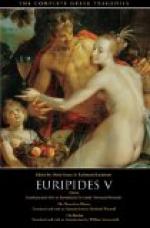The scene represents a hut on a desolate mountain side; the river Inachus is visible in the distance. The time is the dusk of early dawn, before sunrise. The PEASANT is discovered in front of the hut.
PEASANT.
Old gleam on the face of the world, I give thee hail,
River of Argos land, where sail on sail
The long ships met, a thousand, near and far,
When Agamemnon walked the seas in war;
Who smote King Priam in the dust, and burned
The storied streets of Ilion, and returned
Above all conquerors, heaping tower and fane
Of Argos high with spoils of Eastern slain.
So in far lands he prospered; and at home
His own wife trapped and slew him. ’Twas
the doom
Aegisthus wrought, son of his father’s foe.
Gone is that King, and the old spear laid low
That Tantalus wielded when the world was young.
Aegisthus hath his queen, and reigns among
His people. And the children here alone,
Orestes and Electra, buds unblown
Of man and womanhood, when forth to Troy
He shook his sail and left them—lo, the
boy
Orestes, ere Aegisthus’ hand could fall,
Was stolen from Argos—borne by one old
thrall,
Who served his father’s boyhood, over seas
Far off, and laid upon King Strophios’ knees
In Phocis, for the old king’s sake. But
here
The maid Electra waited, year by year,
Alone, till the warm days of womanhood
Drew nigh and suitors came of gentle blood
In Hellas. Then Aegisthus was in fear
Lest she be wed in some great house, and bear
A son to avenge her father. Close he wrought
Her prison in his house, and gave her not
To any wooer. Then, since even this
Was full of peril, and the secret kiss
Of some bold prince might find her yet, and rend
Her prison walls, Aegisthus at the end
Would slay her. Then her mother, she so wild
Aforetime, pled with him and saved her child.
Her heart had still an answer for her lord
Murdered, but if the child’s blood spoke, what
word
Could meet the hate thereof? After that day
Aegisthus thus decreed: whoso should slay
The old king’s wandering son, should win rich
meed
Of gold; and for Electra, she must wed
With me, not base of blood—in that I stand
True Mycenaean—but in gold and land
Most poor, which maketh highest birth as naught.
So from a powerless husband shall be wrought
A powerless peril. Had some man of might
Possessed her, he had called perchance to light
Her father’s blood, and unknown vengeances
Risen on Aegisthus yet.
Aye,
mine she is:
But never yet these arms—the Cyprian knows
My truth!—have clasped her body, and she
goes
A virgin still. Myself would hold it shame
To abase this daughter of a royal name.
I am too lowly to love violence. Yea,
Orestes too doth move me, far away,
Mine unknown brother! Will he ever now
Come back and see his sister bowed so low?




